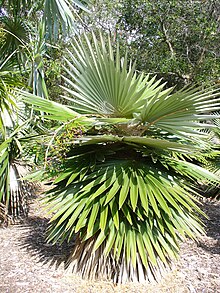| Coccothrinax borhidiana | |
|---|---|

| |
| Coccothrinax borhidiana at Montgomery Botanical Center,
Miami, Florida Photo by Scott Zona | |
|
Scientific classification
| |
| Kingdom: | Plantae |
| Clade: | Tracheophytes |
| Clade: | Angiosperms |
| Clade: | Monocots |
| Clade: | Commelinids |
| Order: | Arecales |
| Family: | Arecaceae |
| Genus: | Coccothrinax |
| Species: | C. borhidiana
|
| Binomial name | |
| Coccothrinax borhidiana | |
Coccothrinax borhidiana (guano, [2] Borhidi's guano palm) [3] is a palm which is endemic to Matanzas Province in Cuba. [4] Like other members of the genus, C. borhidiana is a fan palm.
Coccothrinax borhidiana is restricted to an area of less than 10 km2 on raised limestone beaches near the sea and is threatened by development and livestock grazing. [1]
It was named after Attila Borhidi, Hungarian botanist.
References
- ^ a b Moya, C. (1998). "Coccothrinax borhidiana". IUCN Red List of Threatened Species. 1998: e.T38478A10115507. doi: 10.2305/IUCN.UK.1998.RLTS.T38478A10115507.en. Retrieved 19 November 2021.
- ^ Henderson, Andrew; Galeano, Gloria; Bernal, Rodrigo (1995). Field Guide to the Palms of the Americas. Princeton, New Jersey: Princeton University Press. p. 48. ISBN 0-691-08537-4.
- ^ "Coccothrinax borhidiana". Palm & Cycad Societies of Australia. Retrieved 2007-11-13.
- ^ "Coccothrinax borhidiana". Royal Botanic Gardens, Kew: World Checklist of Selected Plant Families. Retrieved 2019-02-25.
| Coccothrinax borhidiana | |
|---|---|

| |
| Coccothrinax borhidiana at Montgomery Botanical Center,
Miami, Florida Photo by Scott Zona | |
|
Scientific classification
| |
| Kingdom: | Plantae |
| Clade: | Tracheophytes |
| Clade: | Angiosperms |
| Clade: | Monocots |
| Clade: | Commelinids |
| Order: | Arecales |
| Family: | Arecaceae |
| Genus: | Coccothrinax |
| Species: | C. borhidiana
|
| Binomial name | |
| Coccothrinax borhidiana | |
Coccothrinax borhidiana (guano, [2] Borhidi's guano palm) [3] is a palm which is endemic to Matanzas Province in Cuba. [4] Like other members of the genus, C. borhidiana is a fan palm.
Coccothrinax borhidiana is restricted to an area of less than 10 km2 on raised limestone beaches near the sea and is threatened by development and livestock grazing. [1]
It was named after Attila Borhidi, Hungarian botanist.
References
- ^ a b Moya, C. (1998). "Coccothrinax borhidiana". IUCN Red List of Threatened Species. 1998: e.T38478A10115507. doi: 10.2305/IUCN.UK.1998.RLTS.T38478A10115507.en. Retrieved 19 November 2021.
- ^ Henderson, Andrew; Galeano, Gloria; Bernal, Rodrigo (1995). Field Guide to the Palms of the Americas. Princeton, New Jersey: Princeton University Press. p. 48. ISBN 0-691-08537-4.
- ^ "Coccothrinax borhidiana". Palm & Cycad Societies of Australia. Retrieved 2007-11-13.
- ^ "Coccothrinax borhidiana". Royal Botanic Gardens, Kew: World Checklist of Selected Plant Families. Retrieved 2019-02-25.
